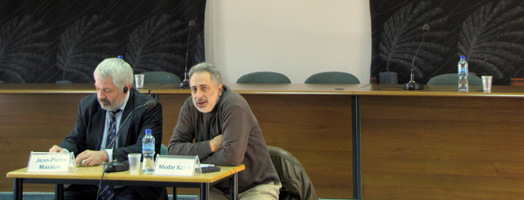Democratic Transformations and Arab Revolutions
On 7 December 2011, the Institute of Law (IoL) at Birzeit University organised a legal encounter on the Democratic Transformations and Arab Revolutions. The presentation was made by Jean-Pierre Massias, Professor of Public Law at the French University of Pau in France.
Having welcomed the guest and audience, Dr. Mudar Kassis, Professor of Cultural Studies at Birzeit University, highlighted significance of the legal encounter as it would address Arab revolutions and democratic transformation throughout the Arab World from the perspective of constitutional law. Dr. Kassis expressed his hope that the presentation would be constructive and purposeful.
In his opening remarks, Professor Massias thanked Birzeit University, expressing his happiness of being on campus.
Professor Massias defined democratisation as a shift from dictatorship to democracy. In the context of the so-called Arab Spring, current Arab revolutions are a form of democratisation. These revolutions comprise the fourth wave of democratisation, which the world has witnessed since 1920. Stressing the sensitive and complicated nature of these revolutions, Professor Massias invoked Huntington’s Model as tool to judge whether democratic transformation in the Arab World is effective or not.
Professor Massias explained that democratic transformation is expressed in several forms. As was the case in Romania, a radical democratisation removes the authoritarian regime, including all of its components and figures. In other contexts, such as Morocco, the authoritarian regime changes itself by itself through integrating the opposition within the regime. Alternatively, negotiations are initiated between the authoritarian regime and opposition, leading to an agreement on democratic transformation.
Professor Massias explained that Arab oppositions have chosen national councils as spokespersons of revolutions. On the other hand, democratic transformation is accompanied by a significant constitutional process, forcing new regimes to act in line with democratic principles that are enshrined in the constitution.
Professor Massias emphasised that the Arab World is still at the beginning of the road. The transformation process, which is currently in labour, needs time to establish democracies. The mere fact that a dictator falls or steps aside is not sufficient to materialise a democratic shift. We should wait to see results of these revolutions. Professor Massias stated that the international community’s position towards Arab revolutions is guided by individual state interests. He further stressed the Western caution of the rise of Islamists to power as a result of this transformation.
The audience made significant contributions in the ensuing discussion. Participants made a general criticism of Huntington’s Model, stating that it cannot be used to judge revolutions in the Arab World. They also asked why the speaker did not address the reasons why Arab peoples have taken to the streets.
The legal encounter was presented in partnership with the Konrad Adenauer Stiftung.










